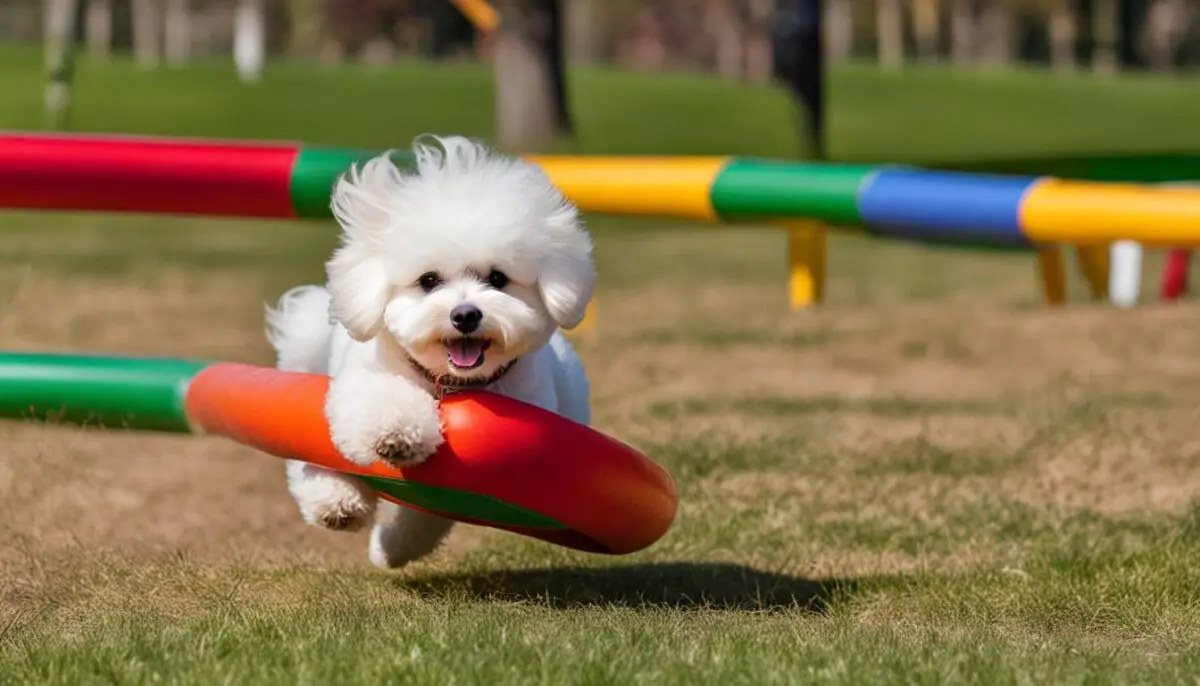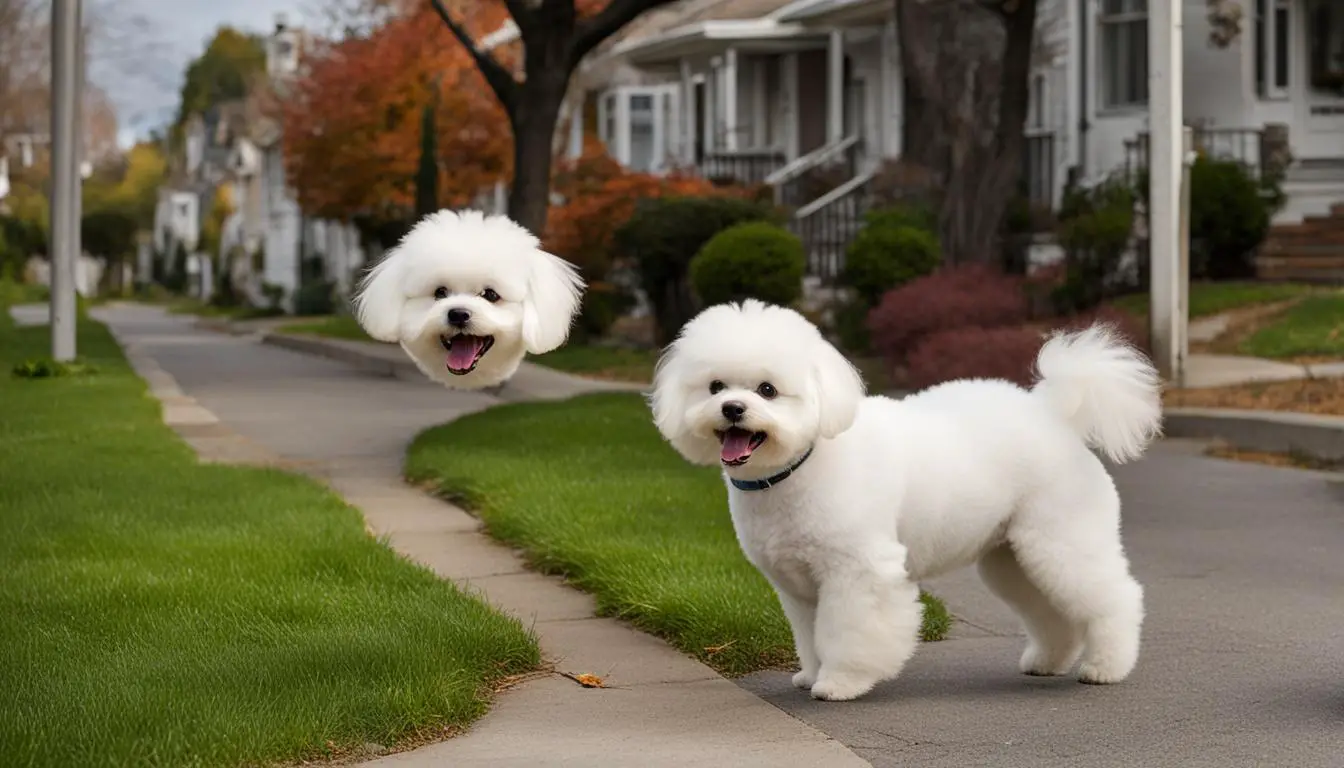Are you tired of constant barking from your Bichon Frise? Excessive barking in Bichon Frise can be frustrating for both the dog and its owners. But don’t worry, there are strategies to help you address this issue and restore peace in your home. In this article, we will explore effective techniques to manage your Bichon Frise’s reactive barking and provide a more tranquil environment for everyone.
Key Takeaways:
- Understanding your Bichon Frise’s triggers is the first step to managing their barking.
- Desensitization and counter-conditioning techniques can help reduce reactive barking.
- Positive reinforcement and redirecting your Bichon Frise’s attention are effective training methods.
- Providing adequate exercise and mental stimulation can prevent pent-up energy that leads to excessive barking.
- Creating a calm environment with a designated play area and soothing scents can help reduce anxiety and barking.
Do Bichon Frise bark much?
Understand Your Bichon Frise’s Triggers
Reactive barking in Bichon Frises can be a common issue that many owners face. To effectively manage this behavior, it is essential to understand the triggers that cause your Bichon Frise to bark excessively. By identifying these triggers, you can develop a targeted plan to address the problem. Do Bichon Frise bark much?
There are several common reasons for Bichon Frise barking, including encountering other dogs, strangers approaching, and loud noises. These triggers can evoke a reactive response in your dog, leading to excessive barking. By pinpointing the specific triggers that affect your Bichon Frise, you can tailor your training and behavior modification techniques accordingly.
“Understanding your Bichon Frise’s triggers is the key to effectively managing their reactive barking.”
One way to identify your Bichon Frise’s triggers is to observe their behavior in different situations. Take note of what causes them to bark excessively and make a record of these triggers. This will help you create a targeted plan to desensitize and counter-condition your dog to these triggers, as we will explore in the next sections.
Understanding Your Bichon Frise’s Triggers
- Encountering other dogs
- Strangers approaching
- Loud noises
By understanding your Bichon Frise’s triggers and addressing them through training and behavior modification techniques, you can help reduce their reactive barking and create a more peaceful environment for both you and your furry companion.
| Trigger | Effect on Bichon Frise |
|---|---|
| Encountering other dogs | Elicits a reactive response and excessive barking |
| Strangers approaching | Triggers anxiety and defensive behavior resulting in barking |
| Loud noises | Startles the Bichon Frise leading to reactive barking |
Identifying your Bichon Frise’s triggers is the first step in effectively addressing their reactive barking. By understanding what causes them to bark excessively, you can implement the appropriate training techniques to help them overcome their reactive behavior.excessive barking in Bichon Frise
Tips to Control Barking in Bichon Frise
If your Bichon Frise tends to bark excessively, there are several strategies you can use to help reduce their barking and create a more peaceful environment for both you and your furry friend. One effective technique is desensitization, which involves gradually exposing your Bichon Frise to their triggers in a controlled manner.excessive barking in Bichon Frise
Start by identifying the specific triggers that cause your Bichon Frise to bark, such as encountering other dogs or loud noises. Once you know what triggers their barking, you can begin the desensitization process. For example, if your dog barks at other dogs, you can start by exposing them to a calm and friendly dog from a distance. Reward your Bichon Frise for remaining calm and gradually decrease the distance between them over time. This process helps your dog become less reactive to the trigger, ultimately reducing their barking.excessive barking in Bichon Frise
Another effective method to reduce barking in Bichon Frises is counter-conditioning. This technique involves pairing the trigger that causes barking with something positive to change your dog’s emotional response. For instance, if your dog barks at strangers approaching, you can give them a treat or engage them in play whenever someone approaches. Over time, your Bichon Frise will begin to associate the trigger with a positive experience, which can help reduce their reactive barking.
Table: Desensitization Steps
| Step | Description |
|---|---|
| Step 1 | Identify the triggers that cause barking. |
| Step 2 | Expose your Bichon Frise to the trigger at a comfortable distance. |
| Step 3 | Reward calm behavior and gradually decrease the distance to the trigger. |
| Step 4 | Continue rewarding calm behavior and maintain consistency. |
Remember to use positive reinforcement throughout the desensitization and counter-conditioning process. Reward your Bichon Frise for remaining calm and quiet in situations that typically trigger barking. This can be done through praise, treats, or affection. By reinforcing the desired behavior, your dog will learn alternative ways to cope with their triggers and reduce their barking over time.how to stop bichon frise from barking
Implementing these tips and techniques can help you manage and reduce barking in your Bichon Frise, creating a more peaceful home environment for both you and your furry companion. tips to control barking in bichon frise
Use Counter-Conditioning with Your Bichon Frise
Counter-conditioning is a highly effective strategy to minimize barking in Bichon Frises. By pairing the trigger that causes your dog to bark with something positive, you can change their emotional response and reduce their reactive behavior. This technique helps your Bichon Frise associate the stimulus with a pleasant experience, ultimately decreasing their barking.noise level of bichon frise
One approach to counter-conditioning is to use treats as a positive reinforcer. When your Bichon Frise encounters a trigger that typically elicits barking, such as another dog, offer them a high-value treat and praise them for remaining calm. Over time, your dog will start associating the presence of other dogs with rewards, leading to a reduction in barking.minimizing barking in bichon frise
Counter-conditioning involves pairing the trigger with something positive, such as treats or toys, to change your Bichon Frise’s emotional response.
Another effective way to implement counter-conditioning is through the use of toys or play. If your Bichon Frise barks at strangers approaching, for example, introduce a favorite toy or engage them in a game when someone approaches. This will redirect their focus and create a positive association with the trigger, helping to minimize their barking in similar situations. bichon frise barking problem
Consistency is key when using counter-conditioning techniques. It’s important to be patient and continue reinforcing positive behavior whenever your Bichon Frise encounters their triggers. With time and practice, you can successfully reduce their barking and create a calmer environment for both you and your furry companion.

Counter-Conditioning Tips:
- Choose high-value treats or toys that your Bichon Frise finds particularly rewarding.
- Start counter-conditioning at a distance where your dog can remain calm and focused.
- Gradually decrease the distance between your dog and the trigger as they become more comfortable.
- Always reward calm behavior and avoid punishing or scolding your Bichon Frise for barking.
- Seek the guidance of a professional dog trainer if you need additional assistance with counter-conditioning.
Implementing counter-conditioning techniques along with other strategies outlined in this article can greatly reduce barking in Bichon Frises. By addressing the root causes of their reactive behavior and providing them with positive alternatives, you can help your Bichon Frise lead a happier, quieter life.strategies to reduce barking in bichon frise
Use Positive Reinforcement with Your Bichon Frise
Reward-based training techniques are highly effective when it comes to reducing barking in Bichon Frises. By using positive reinforcement, you can encourage your dog to exhibit calm and quiet behavior in situations that typically trigger barking.
One of the most important aspects of positive reinforcement is timing. When your Bichon Frise remains calm and quiet in a triggering situation, immediately praise them and offer a treat or affection. This helps them understand that their calm behavior is desirable and will be rewarded.excessive barking in Bichon Frise
Consistency is key in positive reinforcement training. Make sure to reward your Bichon Frise every time they exhibit the desired behavior. Over time, they will associate the trigger with positive experiences and learn alternative ways to cope with their barking triggers.
It’s important to note that positive reinforcement should be used in conjunction with other techniques, such as desensitization and counter-conditioning, for optimal results. By combining these strategies, you can effectively reduce barking in your Bichon Frise and create a peaceful environment for both your dog and your family.
Teach Your Bichon Frise the “Quiet” Command
Training your Bichon Frise to respond to the “quiet” command can be an effective way to stop excessive barking. By teaching your dog to associate the command with being calm and quiet, you can redirect their behavior and promote a peaceful environment.
To begin, choose a quiet and distraction-free environment for training sessions. Have some treats handy as rewards for your Bichon Frise’s good behavior. When your dog starts barking, calmly say “quiet” and wait for them to stop. As soon as they become quiet, reward them with a treat and praise them for their silence. Repeat this process consistently during training sessions.
It’s important to be patient and consistent when training the “quiet” command. Your Bichon Frise may take some time to understand what you’re asking of them. By reinforcing the behavior with rewards and praise, you can help your dog associate the command with the desired outcome.
Remember that training should always focus on positive reinforcement rather than punishment. Avoid yelling or scolding your Bichon Frise for barking, as this can create anxiety and worsen the behavior. Instead, stay calm and patient throughout the training process, rewarding your dog for their progress.

By consistently teaching your Bichon Frise the “quiet” command and rewarding them for being calm, you can effectively stop excessive barking. With time and dedication, you and your furry companion can enjoy a quieter and more peaceful living environment.
Redirect Your Bichon Frise’s Attention
Redirecting your Bichon Frise’s attention is an effective strategy for managing their barking and encouraging alternative behaviors. When your dog starts barking, it’s important to intervene and redirect their focus towards a more productive activity. This not only helps to prevent excessive barking but also teaches your Bichon Frise to respond to stimuli in a different way.
One way to redirect your Bichon Frise’s attention is by offering them a toy or engaging in a training session. Providing them with a new task or puzzle to solve can shift their focus away from the trigger that was causing them to bark. By engaging their mind and providing mental stimulation, you can help redirect their energy into a more positive and productive outlet.
Redirecting your Bichon Frise’s attention can be as simple as saying a command like “sit” or “down” when they start barking. By giving them a clear instruction and rewarding them for following it, you redirect their focus and reinforce the desired behavior of being calm and quiet.
Remember to be patient and consistent when redirecting your Bichon Frise’s attention. It may take time for them to learn and respond to the redirection, but with practice, they can develop new habits and behaviors that reduce barking. Additionally, always ensure that the redirected activity is safe and appropriate for your dog.
Redirect Your Bichon Frise’s Attention: Tips
- Keep a supply of interactive toys or puzzle games on hand to redirect your Bichon Frise’s attention when they start barking.
- Engage in short training sessions throughout the day to redirect their focus and provide mental stimulation.
- Use positive reinforcement, such as treats or praise, when your dog redirects their attention effectively.
- Be consistent with redirecting their attention and reinforcing desired behaviors to create long-term habits.
By redirecting your Bichon Frise’s attention, you can help them develop alternative behaviors to excessive barking. Remember, patience and consistency are key to successfully redirecting their focus and creating a more peaceful environment for both you and your furry friend.
Provide Adequate Exercise and Mental Stimulation for Your Bichon Frise
Reducing pent-up energy in Bichon Frise through exercise and mental stimulation is crucial for managing their reactive barking. Bichon Frises are an active and energetic breed, and if they don’t receive enough physical activity, they can become restless and prone to excessive barking.
To ensure your Bichon Frise gets enough exercise, take them on daily walks to provide mental and physical stimulation. Engage in interactive play sessions using toys that require chasing, fetching, or problem-solving. Additionally, consider incorporating mental exercises such as puzzle toys or treat-dispensing toys to keep their minds engaged.
Another effective way to provide mental stimulation is through training sessions. Bichon Frises are intelligent dogs that thrive on learning new commands and tricks. Spend dedicated time each day teaching them new skills, which will tire them out mentally and reduce their pent-up energy.
Remember to adjust the amount and intensity of exercise based on your Bichon Frise’s age, health, and individual needs. Consult with your veterinarian or a professional dog trainer to determine the appropriate exercise routine for your furry friend.

Benefits of Exercise and Mental Stimulation:
- Reduces pent-up energy and restlessness
- Prevents boredom and destructive behaviors
- Promotes overall physical and mental well-being
- Strengthens the bond between you and your Bichon Frise
- Improves obedience and focus during training sessions
By providing your Bichon Frise with adequate exercise and mental stimulation, you can help them release their energy in a healthy way, leading to a calmer and quieter demeanor.
Create a Calm Environment for Your Bichon Frise
If your Bichon Frise is prone to reactive barking, creating a calm environment can help reduce anxiety and promote a peaceful space for your furry friend. Here are some strategies to consider:
- Designate a Quiet Area: Set up a comfortable bed or crate in a quiet corner of your home where your Bichon Frise can retreat to when they need some downtime. This will provide them with a safe and secure space to relax and unwind.
- Use Calming Scents: Certain scents, such as lavender or chamomile, can have a soothing effect on dogs. Consider using a dog-friendly aromatherapy diffuser or spray to create a calming atmosphere in your home.
- Play Soothing Sounds: Soft classical music, nature sounds, or specially designed calming music for dogs can help drown out external noises and create a peaceful ambiance for your Bichon Frise.
- Establish a Routine: Dogs thrive on routine, so try to establish a consistent daily schedule for feeding, exercise, playtime, and rest. This routine will provide a sense of security and stability for your Bichon Frise.
“A calm environment is essential for reducing anxiety in Bichon Frises. By creating a designated quiet area, using calming scents and sounds, and establishing a daily routine, you can help your furry friend feel safe and relaxed.”
Remember, every Bichon Frise is unique, so it may take some trial and error to find the strategies that work best for your dog. By creating a calm environment, you can help reduce anxiety and provide a peaceful space for your Bichon Frise to thrive in.
Conclusion
In conclusion, managing excessive barking in Bichon Frise requires a combination of effective strategies. By identifying your dog’s triggers and implementing desensitization and counter-conditioning techniques, you can help reduce reactive barking.
Positive reinforcement and redirecting your Bichon Frise’s attention towards alternative behaviors are valuable tools in preventing excessive barking. Consistently training your dog to respond to the “quiet” command and providing adequate exercise and mental stimulation are also crucial to managing barking.
Creating a calm environment for your Bichon Frise, with a designated peaceful space and using calming scents or sounds, further aids in reducing anxiety and excessive barking. With patience and dedication, you can help your Bichon Frise learn alternative ways to cope with their triggers, resulting in a more peaceful home environment for both you and your furry friend.
FAQ
Do Bichon Frises bark a lot?
Bichon Frises can be prone to reactive barking, which can become excessive and bothersome for both the dog and its owners.
What are common triggers for Bichon Frise barking?
Bichon Frises can bark in response to encountering other dogs, strangers approaching, or loud noises.
How can I desensitize my Bichon Frise to triggers?
Gradually exposing your Bichon Frise to their triggers at a comfortable distance and rewarding calm behavior can help them become less reactive over time.
What is counter-conditioning and how can it help reduce barking?
Counter-conditioning involves pairing the trigger with something positive, such as treats or toys, to change your Bichon Frise’s emotional response and ultimately reduce their reactive barking.
How can I use positive reinforcement to address barking?
Rewarding your Bichon Frise for remaining calm and quiet in situations that typically trigger barking helps reinforce appropriate behavior and teaches them alternative ways to cope with their triggers.
How can I teach my Bichon Frise the “quiet” command?
By calmly saying “quiet” when they start barking and rewarding them when they are silent, you can train your Bichon Frise to understand and respond to the command.
How can I redirect my Bichon Frise’s attention away from barking?
You can try redirecting their attention to a more productive activity like playing with a toy or engaging in training, which trains them to respond to stimuli in a different way and reduces barking.
How can I provide adequate exercise and mental stimulation for my Bichon Frise?
Daily walks, play sessions, and interactive toys are effective ways to meet your Bichon Frise’s physical and mental needs, helping reduce pent-up energy and prevent excessive barking.
What can I do to create a calm environment for my Bichon Frise?
Providing a comfortable bed, designated play area, and using calming scents or soothing sounds can promote relaxation and reduce anxiety, contributing to a more peaceful space for your Bichon Frise.
What strategies can I use to manage Bichon Frise barking?
By identifying triggers, using desensitization and counter-conditioning techniques, employing positive reinforcement, teaching the “quiet” command, redirecting attention, providing exercise and mental stimulation, and creating a calm environment, you can effectively manage and reduce excessive barking in your Bichon Frise.
